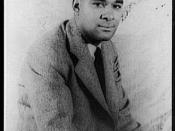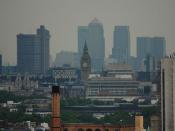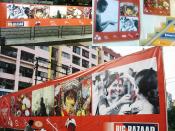The Environmental Shaping of a Common Black Man
There was a line that separated the city of Chicago in the 1930's. It was not shown on any map, nor was it named on any street sign. Yet it was known by all; you stayed on your side of the line. No one actively enforced this "law" but everyone obeyed. The Black Belt, an area of poverty and grief-stricken African Americans, was isolated in a corner, apart from the rest of Chicago. Rarely, if ever, a man would cross over the line into the other part of the city. Being an African American in these times provided many difficulties for Bigger Thomas, the main character in Native Son, a novel written by Richard Wright. As a black man in a city of whites, Bigger had lived his life with an animosity toward those around him. This feeling of hatred was not an innate emotion, but one inherited by years of life in an environment governed by a racist white supremacist society.
It was this feeling of spite that clouded Bigger's judgement and created unfortunate situations in which the actions he committed are not a result of Bigger's conscious thought, but his environment.
Mr. Thomas, father of three, died in a riot while Bigger, the eldest child, was still a young boy. Bigger's mother struggled to raise her three children on a very meager allowance from a relief organization. With no person to support the family financially, the Thomas' had to rely on the relief for the source of all sustenance. All his life Bigger had been hassled to support his family, as he was the oldest male. "You going to take the job, ain't you, Bigger?" (14) "You know, Bigger, if you don't take that job the relief'll cut us...


